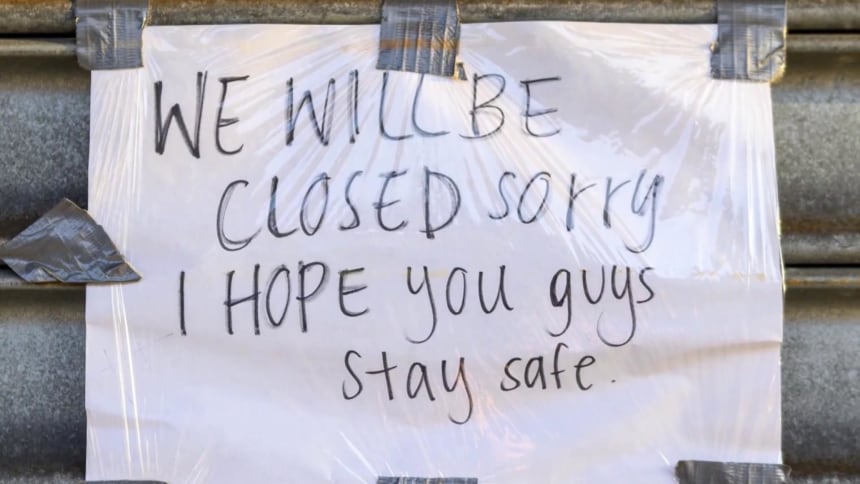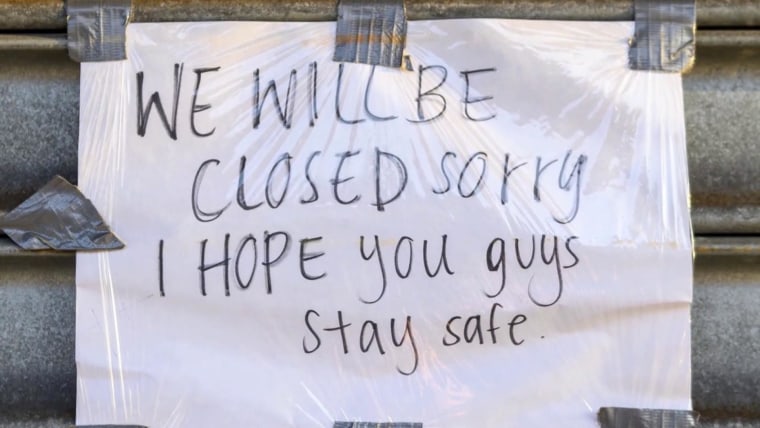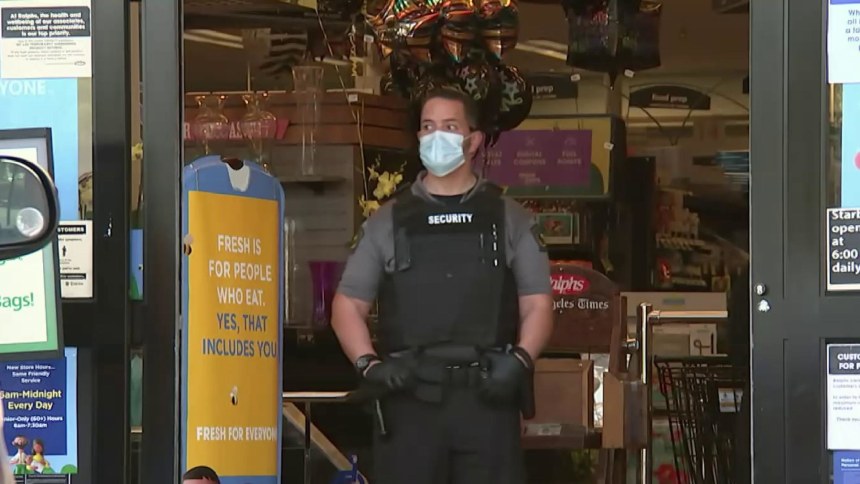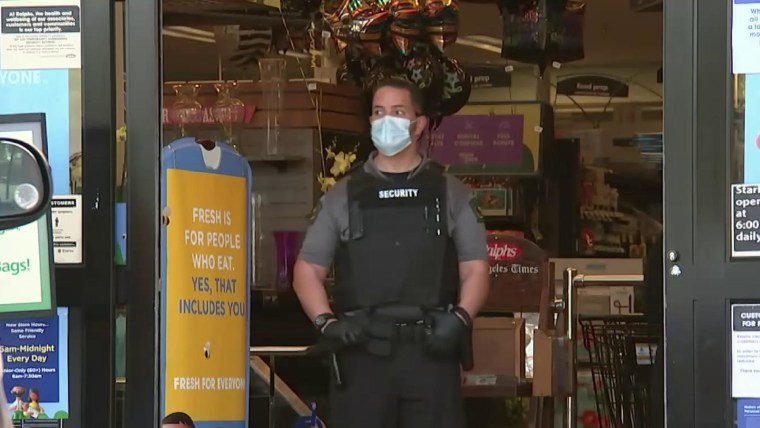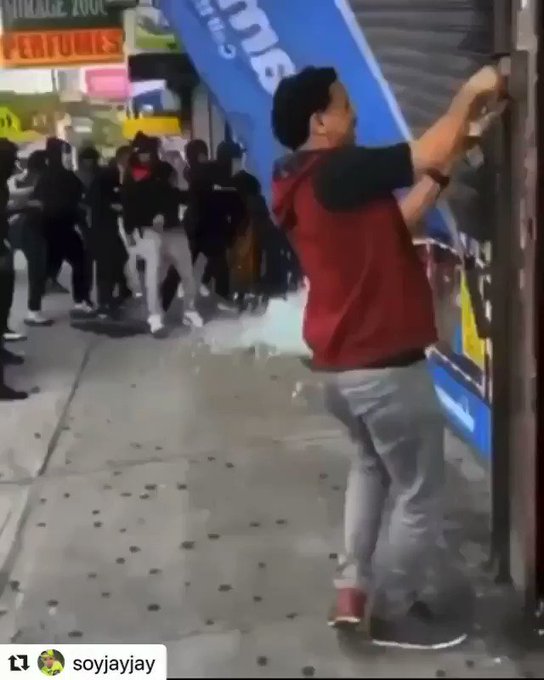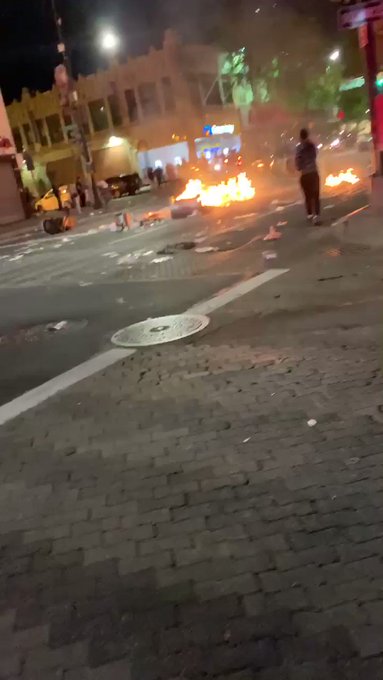
Looting and vandalism in cities across the country have dealt another blow to small businesses that were already reeling from the coronavirus outbreak.
Along with big chain stores like Target, Walgreen, and Macy’s, independent retailers in neighborhoods and downtown sections were targets of vandals and looters who struck as police mobilized to contain large demonstrations over the killing of George Floyd in Minneapolis.
Many businesses had been closed by state and local government orders as officials tried to contain the spread of the coronavirus, leaving owners with little or no revenue since March. Now, already facing an uncertain future amid ongoing restrictions related to the virus, owners must figure out how to rebuild or relocate their companies.
Over three nights, Ahmed Muhumud’s Minneapolis optician shop was vandalized, looted, and burned, leaving Midtown Eye Care in ruins. The store was just getting back to business after having been shut since mid-March by the virus outbreak.
“This has been a difficult couple of months, and now with the protesters and everything that followed — it’s very difficult,” Muhumud said.
He’s trying to figure out what to do next; the building, which may not be salvageable, is in a hard-hit area with many minority-owned businesses that were also looted and burned.
“We don’t know where to move,” Muhumud said.
Small businesses employ nearly 60 million people or nearly half the U.S. workforce. Since the coronavirus brought the U.S. economy to a virtual standstill, the government has loaned businesses hundreds of billions of dollars to help them survive and keep their employees on staff as unemployment soars toward 20%. But some won’t make it, and bankruptcies are already on the rise.
Even as they pick up pieces of broken glass and try to assess their losses, many owners say they understand the anger over the killing of Floyd, who died after a police officer pressed his knee into Floyd’s neck for several minutes even after he stopped moving and pleading for air.
Johnny Grimes reopened his hair salon in Birmingham, Alabama, on Sunday after being closed for two months due to the virus outbreak. That night the windows of the Wheelhouse Salon were shattered and the establishment looted.
As Grimes boarded up the salon Monday, he said he was devastated by what had happened to his business but was sympathetic to those who demonstrated against police brutality.
“I just hope that this isn’t all for nothing,” he said. “I hope that this does spark some kind of national conversation on race, racial reconciliation, police brutality and how the African American, the black community, is treated in America,” said Grimes, who is white.
Sam Mabrouk tried to save his denim clothing store from being vandalized and left barren amid demonstrations Friday in downtown Columbus, Ohio. Mabrouk, who arrived from Egypt over a decade ago, owns two retail stores in the city; one, 89 and Pine, was destroyed.
Mabrouk said he tried to convince the people ransacking his store and other minority-owned businesses nearby that he understood their cause and begged them to leave his store alone.
“I lost everything in one night,” Mabrouk said of the estimated $70,000 in stolen merchandise. “That was my savings from 11 years of working. That’s what hurts more than anything.”
Mabrouk had already lost business due to being shut down amid the virus outbreak but said he wouldn’t give up.
“Even if I only have a thousand pairs of jeans to sell and nothing else, I will start from there,” Mabrouk said.
In Boston, vandals shattered the front windows at Clarendon Wines Sunday night and stole much of the alcohol at the front of the shop in the city’s high-end Back Bay neighborhood.
“We never thought this could happen,” said Kayla Levine, a manager at the store that’s been family-owned since the 1940s. “Boston has been good about protests. They’ve been mostly peaceful. We were hoping for the best this time.”
Levine said she supported the mostly peaceful demonstrations but felt other people had taken advantage of Sunday’s protests to cause destruction.
“It’s just really sad because the message gets skewed,” she said.
Like other stores, Clarendon Wines has been contending with a steep drop in revenue due to the pandemic. The store normally relies heavily on workers in nearby office complexes for its sales, but those customers have been working from home.
The pandemic remains an issue for businesses that are able to keep operating because social distancing requirements and weak consumer spending are likely to limit their revenue and income. Many owners, especially restaurateurs, have been uncertain about the future because of the virus, and the violence following Floyd’s death has added to that uncertainty.
On Monday, one of Patrick & Co.’s two San Francisco stationery stores was held up at knifepoint; the thief took backpacks and threatened employees but no one was hurt. The attack came after both stores had windows broken and merchandise stolen, not only during the protests but also twice as they were shut due to the pandemic.
Owner Jamie Patrick estimates that even with insurance reimbursement, the damage will cost between $15,000 and $20,000, a lot of money in the best of times for a small business, but harder to come up with when revenue is still down because of the pandemic.
“Having to replace windows and deal with everything else at this point is tough. But we stand with all the people who are protesting peacefully,” Patrick said.
Mercado, a Minneapolis marketplace for Latino retailers and restaurants, has been closed since March because of the virus outbreak. The restaurants planned to open for outdoor seating on Monday, but last week’s violence and looting have forced a delay, says Mercado general manager Eduardo Barrera.
The tenants have not yet visited Mercado, and so the damage was still being assessed, Barrera said.
“I have no idea when we’re going to begin coming back,” he said.
Restless coffee addicts emerging from lockdowns are doubtlessly cheering the return of some normalcy, after Starbucks said it would be reopening almost 90 percent of its locations by June 1.
But many employees are questioning why a company known for its highly personalized drinks is opting for a one-size-fits-all policy when it comes to nationwide reopenings amid a public health crisis.
"It seems to be bad to reopen when you have an ongoing worsening pandemic," said one barista in Chicago who is currently on quarantine after his manager came down with a fever.
At a time when few other companies have made a definitive public statement about their timeline, Starbucks began reopening stores May 4, with new sanitation and safety protocols that include worker temperature and health checks, required masks, closed seating areas, and only drive-thru or mobile orders.
Former Starbucks CEO expects 30 percent of businesses will permanently close
APRIL 23, 202003:15
But even with these precautions, workers are terrified of going to work and say it is difficult to stay safe among eager customers, some of whom do not follow health protocols.
Just weeks into reopening stores, workers are already going into quarantine with suspected or positive coronavirus infections, according to NBC News interviews with more than a dozen Starbucks managers and baristas who spoke on the condition of anonymity out of fear of retaliation. At one central Jersey store, the Starbucks team switched to block scheduling in which the morning shifts and the afternoon shifts never cross, to decrease the chances of spreading the virus. The company rolled out the new scheduling strategy after someone at a nearby store tested positive for the virus, the store's barista said.
Starbucks said that while it can’t speak to individual store formats because the situation is fluid, changes in scheduling are being considered and discussed with local leadership in markets where applicable.
"I don’t think any store should have been open until we had a better handle as a nation on this outbreak. I think opening right now is a risk to employees and the public," one manager in southeastern Massachusetts said.
"We are borrowing strongly from our lessons navigating this in China," Starbucks CEO Kevin Johnson wrote in a blog post-Thursday. “We have stood strong, together — ALL of us — and made a commitment to do our part to keep partners’ care front and center as we weather the storm."
The company said that its decisions to support its frontline store employees go back more than three months and include extending child care benefits, mental health benefits, and catastrophe pay.
But Max, a barista in Chicago who asked to only be identified by a first name out of fear of retaliation, said workers are still at risk.
“Why are we putting out all the people at Starbucks, many of whom are parents and care workers, making them decide to risk their own lives to serve someone who thinks they’re helping the economy by ordering a frappuccino?” Max asked.
The pandemic pummeled the retail and the restaurant industries as states announced stay-at-home orders to curb the spread of the coronavirus. Starbucks kept about half of its 15,000 U.S. stores open during the pandemic. But its sales still plunged 25 percent during the first three months of the year compared to the same time last year, “related to the COVID-19 outbreak,” the company reported last month.
Starbucks workers referred to as “partners," said that when their stores open, they can either go back to work or use accrued sick time. They also have the option to take unpaid leave through September, but may not qualify for state unemployment benefits. The company's catastrophe pay, which is an average of a worker's usual pay, ends May 31. However, Starbucks will cover the health care premiums for eligible workers on COVID-19 leave.
“It felt like an ultimatum to me,” one barista in Phoenix said. “It felt like any way I go, I am screwed.”
More than a dozen Starbucks workers interviewed said they felt they had to choose between returning to work or losing income.
“I just wonder if it’s worth it. Most of us working at Starbucks are working because we need a paycheck.”
Every day, workers get their temperature checked and use an iPad app called “Covid Coach” that takes them through a list of symptoms of the virus, including questions about recent travel or contact with anyone who has been exposed to the virus. The survey is confirmed by the store manager and sent to the district manager, according to one barista in central Jersey.
Yet even though some employees say the policy is "one of the most effective in the market, supplying us with masks, disinfectants and regular washing procedures,” they still ask themselves if it’s worth it.
“Right now I need a paycheck, I need benefits. Most of us working at Starbucks are working because we need a paycheck,” one manager said.
Already, some workers have refused to go back to work or are planning to leave out of fear for their health. A barista in South Carolina said that she plans to quit her job at the end of the month when the hazard pay ends. One store manager said five workers quit, which amounts to about 22 percent of her team not returning to work.
“We’re not forcing anyone to come back, but it is a managed risk,” one Starbucks manager said. “We have no idea which customers have been following procedures or who has been in hospitals.”
“We’re not forcing anyone to come back, but it is a managed risk,” she said. “We have no idea which customers have been following procedures or who has been in hospitals.”
If any store has a suspected case of the coronavirus, Starbucks closes the store and sends a third-party work crew to do a deep clean, according to multiple workers. The company said that an infected person and anyone who has been in contact with the person is quarantined with pay for two weeks, while the rest of the workers are asked to return to the store after it is cleaned. The store will not reopen if there is not adequate staffing, the company added.
A barista in Fremont, Nebraska, said the store closed after the district manager came into a meeting with a fever. The store hadn’t even opened yet. A shift supervisor at a Starbucks in Anaheim, California, said that a worker showed coronavirus symptoms just two days after the store reopened. The store closed for two days for deep cleaning and reopened with reduced hours because only four workers did not come into contact with the symptomatic person, according to the supervisor.
Growing tensions as customers clash with stores over masks
MAY 21, 202001:33
Some workers have started online petitions on the nonprofit website Coworker.org calling on the company to close stores, require customers to wear masks or continue pay boosts for working through the pandemic that is set to expire at the end of May. Starbucks did not specifically respond to questions about the petitions.
"Not only should every grocery and retail company mandate the wearing of masks and social distancing, but our state and local governments must also establish these uniform safety standards,” Marc Perrone, president of the United Food and Commercial Workers International Union, which does not represent any Starbucks workers, said in an emailed statement. "For as long as this pandemic endures, companies must implement and enforce store safety measures, and customers must be encouraged to shop smart."
Starbucks employees are just some of the workers across the country who are dealing with issues around safety protections, low pay, and contact with angry or overbearing customers.
Many businesses that stayed open through stay-at-home orders offered workers hazard pay in the form of an hourly pay boost. The Kroger grocery chain announced employees would receive a one-time $400 bonus after an outcry that it planned to cut its hazard pay. Target extended its $2 an hour hazard pay through July 4.
Masks have become a political issue, pushing some companies to avoid insisting upon face coverings, while others make it a rule. President Donald Trump has refused to wear one in public, leading some of his supporters to also refuse to wear any face covering.
In one recent incident posted to Twitter, a Costco employee was berated by a customer who refused to wear a mask. It's a reality for many retail workers who find themselves having to enforce store rules and public health guidelines on masks.
Several Starbucks workers interviewed said customers are often aggressive when staff try to encourage social distancing at the stores. One barista in Arizona said he’s heard customers say they don’t believe in masks and they don't think COVID-19 is “a big deal.”
Another barista in Arlington, Virginia, said she has received complaints from customers who feel the social distancing measures were “unnecessary.” She said the most frequent question customers have is “Why can’t I come in?”
A barista in Phoenix said that during training on the new protocol, the store's crew of 15 had to huddle together with no room for social distancing — and not everyone wore a mask.
“They kept stressing that we’re still a part of the community and part of the reason we’re an essential business is that we’re trying to bring normalcy and joy to people,” he said. “They say partners are the biggest priority — but they’re not showing that.”
In The Bronx, Small Business Owners Reel From Night Of Looting And Vandalism
Sam Ahmad, the owner of a jewelry store in the Fordham section of the Bronx that was looted during last night’s widespread protests against police violence and the killing of George Floyd in Minneapolis, doesn’t think he’ll reopen after 20 years in business. He opened the store when he was 37 years old.
“I’m not getting young,” said Ahmad, standing outside his business, George Jewelry Store on Fordham Road and Elm Place.
Video posted on Twitter Monday showed a group of young people rushing toward his store, grabbing any items they could get before fleeing.
Ahmad, who said he's never seen such vandalism at his business, has since taken all the merchandise out of his store, closing his gates indefinitely.
Mamoun Nofal, the owner of a furniture store in Fordham, also witnessed the vandalism and soon closed his store early.
"I support the protesters, but I don't support the people who break glass," said Nofal. "That makes the good look bad."
As wooden boards went up to cover shattered glass at stores on Tuesday afternoon, what struck many along the Fordham business district—the borough’s largest commercial corridor with more than 200 stores, some still closed because of the pandemic—is the fact that many of the establishments are owned by women and men of color.
At a Tuesday afternoon press conference, elected officials from across the Bronx were quick to condemn the violence. Some who lived through the 1977 blackout that led to widespread looting and vandalism were incensed something similar would reoccur in the large minority neighborhood.
“It took decades for the Bronx to come back,” said Bronx District Attorney Darcel Clark, flanked by lawmakers. "Why would you want to set us back again? There’s a way to do this. Let’s do this peacefully. We are better than this.”

Store owner Sing, standing by a wall inside his store that was looted last night, witnessed his store being looted on Instagram live. DAVID "DEE" DELGADO / GOTHAMIST
Criminal charges are now pending against some suspects arrested for vandalism and looting, Clark said.
Until Monday, the Bronx was relatively unscathed by the unrest that has gripped other parts of NYC. Last night saw some of the more pronounced devastations not just in Fordham but its surrounding neighborhoods. The timing couldn’t be worse for some business owners, who looked forward to the start of Phase 1 reopening that's still slated for June 8th.
Among those forced to close because of the looting was Jessica Betancourt, the owner of an eyewear store on West Burnside Avenue near Jerome Avenue, two miles south of Fordham.
“We are devastated that our neighborhood is turning to violence. Our hard work, I guess, is not paying off,” said Betancourt. “George Floyd died, yes he did. We’re not respecting his memory by committing so much violence. We need to stop this right now. Our small businesses are hurting.”

Bronx Borough President Ruben Diaz Jr. behind a podium, stands with elected officials condemning looting and vandalism during last night's protests. DAVID CRUZ
Ken Johnson, a middle school teacher who lives near 182nd Street and Grand Concourse in Burnside, spent the night guarding the businesses on his block with store owners.
The people who approached his neighbor’s bodega respected their requests to leave the store alone, Johnson said.
“One of the guys got a lot of street cred -- he knows a lot of people on the block so they were able to direct traffic a little bit and not let his doors be touched,” Johnson said. “We tried to speak up for some of the other stores, but what can you really do?”
“It was like a feeding frenzy, everybody coming out everywhere, grabbing, grabbing, grabbing, grabbing,” Johnson added. “So, we just kept our distance and just our main concern was there were a few fires that had been started a little bit further down, and we have buildings here right next to a gas station.”
Still, Johnson said the overall mood on his block was not aggressive or violent. “It was actually almost like a party atmosphere,” Johnson said, with people sharing tips on which stores to avoid and where to go next.
“They targeted certain stores -- there was specifically beauty supplies, liquor stores, cell phone stores were the primary ones,” Johnson said, as well as pawnshops and pharmacies. “So, people were clearly looking for items that they use for their own enjoyment or...to sell.”
Johnson said he saw police sweeping through the area a couple of times overnight.
“The police came through and everybody scattered. Then it seemed like the police pretty much cleared out the blocks and then they jumped into their vehicles to go to the next location,” Johnson said. “But it wasn’t even two minutes from the time that they left to the time that the block filled back up again.”
As a teacher in a nearby middle school and longtime resident of the community, Johnson said what he witnessed was complicated. “You know, these people who own those businesses, they getting caught in the crossfire,” he said. At the same time, “We have been cooped up for three months dealing with a crisis situation with COVID. So everybody is on edge from that. In addition to just the overall climate in the country, having a leader that riles people with this type of aggression and vitriol and then to have these continued incidences of three back-to-back (murders): Breonna Taylor, Ahmaud Arbery, then George Floyd -- to have these situations come back to back, people are just kind of like, 'it ain't gonna change, it ain’t gonna get better. So I’m going to get mine.'”
Councilmember Fernando Cabrera, who represents the Burnside area and parts of Fordham, has called for the National Guard to come to the Bronx, despite the NYPD doubling the number of officers out at night.
“Police officers are telling me privately they need the help. They’re stretched too thin,” said Cabrera. “How long can the Police Department sustain this level working 12-16 hours a day? It’s just not going to happen.”
Asked whether the NYPD was ill-prepared in the Bronx last night, Borough President Ruben Diaz Jr. said "no one saw this coming."
"Remember that this wasn't an organized protest. This is not a rally gone bad" said Diaz. "No one had a heads up. In fact, we were looking at Bay Plaza [Mall]; we were looking at other areas ... and this happened all of a sudden."
This is the current scene on Fordham Road tonight. We are asking you to send out prayers for the safety of the entire Fordham Road community.
281 people are talking about this
At the news conference, Assembly Speaker Carl Heastie, who represents portions of the north Bronx, said the State Legislature is drafting a package of bills aimed at police reform, but would not commit to legislation repealing the state's 50-a statute, which keeps the disciplinary records of police officers private.
"We'll see a package that we'll announce next week," Heastie told Gothamist. "I don't want to get ahead of where we are, but I'd say 50-a is on the list of considerations."
Heastie called the vandalism unacceptable. "It is heartbreaking to see the faces of these black and Latino business owners who have seen these businesses destroyed."
As the news conference was happening, young people fanned out with brooms to clean up debris from the night before. Among them was Erika Marte, whose father's store on Burnside had its safe stolen. Even so, Marte said she could empathize with the looters.
"This is a system that just needs to be taken down," said Marte. "There's nothing good that's going to come out if they don't acknowledge what's happening. This is more than looting. It's coming from something."

